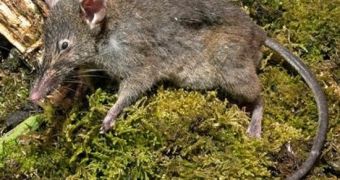Not very long ago, biologists and environmentalists exploring the natural habitats of Indonesia came across a bizarre-looking rodent which seems to only have two teeth. As one can easily imagine, this more than distinguishes it from other representatives of this order of mammals.
Specialists speculate that this newly discovered rodent has gradually gotten rid of its cheek teeth in order to make the most out of whatever food resources its surrounding environment put at its disposal, thus making sure that it needs not compete with other species that also specialize in gnawing.
Mongabay reports that this weird-looking rodent was found in the forests of Mount Latimojong and Mount Gandangdewata. Because of said very unique feature it displays, the researchers agreed that it would be best to establish an entirely new genus for it: Paucidentomys, which translates as “few-toothed mouse.”
As far as naming the species, it was decided that Vermidax (meaning “worm-devourer”) best described these peculiar animals.
Based on the name selected for its species, you have probably already guessed that this rodent mostly feed in worms and on other nutrient sources that do not require that it intensely chew on them.
According to the same source, the paper describing the Vermidax, which was published in the journal Biology Letters, reads as follows: “Stomach contents from a single specimen suggest that the species consumes only earthworms.”
Furthermore, “With the transition to soft-bodied prey, the mouth was relieved of the need to process food by chewing, and therefore was free to evolve according to the pressures of food acquisition.”
From where we stand, this discovery stands as proof that our planet's biodiversity is much more complex than science has so far unveiled, and that our remaining natural ecosystems need be protected so as to make sure that similar first encounters with very interesting creatures will also be possible in the future.

 14 DAY TRIAL //
14 DAY TRIAL //